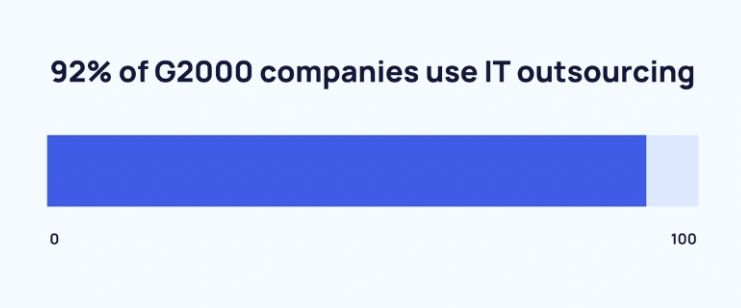The .NET framework is one of the most popular development platforms used by companies and developers around the world. Its versatility, security, stability and continuous updates by Microsoft make it an ideal choice for building robust and scalable applications. However, finding expert .NET developers can be challenging and expensive. This is where partnering with a specialized .NET development outsourcing company can make perfect business sense.
Defining .NET Development Outsourcing
DotNET development outsourcing refers to partnering with a third-party vendor to handle building, implementing and maintaining .NET-based applications. It involves delegating all or parts of your .NET app engineering initiatives to an external team of specialists. Outsourcing models range from staff augmentation, where dedicated resources are provided, to managed services, where the partner takes full ownership. It offers access to world-class skills at an affordable cost through collaboration frameworks fine-tuned for distributed teams.
It was estimated that in 2023, global spending on outsourcing would reach $731 billion. When segmented, IT outsourcing expenditure was anticipated to reach $519 billion in 2023, a 22% increase over 2019 figures when broken down by segment.
Outsourcing .NET development provides flexibility to scale up or down based on workloads and tap into specialized expertise that may not exist in-house. It can accelerate time-to-market for software products through round-the-clock development. Additional benefits include transferring fixed costs to variables, focusing internal teams on core competencies, and gaining insights into global best practices.
Of course, the outsourcing model has many advantages. But why should you definitely consider finding an outsourcing partner?
Access to Top Talent and Domain Expertise
Outsourcing companies maintain dedicated teams of skilled .NET professionals with years of experience in building complex enterprise-grade solutions. They possess cutting-edge domain expertise across various industry verticals to develop customized products that match your business needs.
An outsourcing vendor conducts rigorous recruitment drives and training programs to hire the best talent. This ensures that you get qualified resources without undergoing lengthy local hiring procedures that can take months. Outsourcing partners have an extensive database of pre-screened and qualified .NET developers that allows them to staff projects quickly.
The top .NET developers outsourcing regularly undergo additional training in the latest frameworks and technologies, such as .NET Core, ASP.NET, ADO.NET, and more, to expand their skills. This is difficult to achieve with in-house teams, where ongoing training can be expensive and time-consuming.
Significant Cost Savings
Choosing an offshore outsource .NET development center in countries like India, Ukraine, Poland, etc., over in-house or local on-site hiring in the US, UK, or Europe can save you 50-70% in payroll expenses, allowing you to allocate funds to other critical business operations.
Outsourcing companies also offer flexible hiring models to scale up or down based on your project lifecycles. For example, you can start with a small 3-5 member team and ramp up to over 50+ resources during critical phases of development. This saves you from the huge overhead costs of maintaining large permanent in-house teams in between projects.
Other cost advantages include savings on infrastructure, operations and tooling costs that outsourcing .NET development vendors optimize at scale across clients. Outsourcing also minimizes expenses involved in recruiting, hiring, onboarding and retention efforts, making it a very compelling value proposition.
Focus on Core Business Areas

.NET application development demands specialized technical skills and industry best practices. Attempting to build such solutions in-house can shift your focus away from core business competencies around sales, marketing, service delivery etc.
Partnering with a .NET outsourcing vendor allows you to delegate app engineering entirely needs to external experts. This frees up your resources to concentrate on critical revenue-generating tasks that require direct management attention. Instead of spending time interviewing developers, you can channel those efforts towards high-value activities like acquiring customers and expanding to new markets.
Reduced Time-to-Market
Experienced outsourcing vendors have established processes like code reuse, reference architectures and pre-built frameworks that help accelerate .NET application delivery. Relying on their knowledge and resources can help launch your digital solutions faster, even with tighter deadlines.
For instance, if building a customer portal, the outsourcing partner may already have an existing portal framework that can be easily customized to your specific needs. This prevents delays involved in building a similar framework from scratch in-house.
Outsourcing teams can also seamlessly ramp up with additional bandwidth, allowing you to quickly capitalize on new opportunities or scale up for a big product launch. In contrast, scaling in-house capacity can be time-intensive, involving multiple cycles of recruiting and onboarding.
Access to Enterprise-Grade Infrastructure
Leading offshore development companies invest heavily in advanced cloud infrastructure, security protocols, disaster recovery systems and quality standards certifications.
Leveraging such robust delivery mechanisms ensures your applications are built on highly reliable and scalable architectures that can handle spikes in traffic volumes. It also helps in compliance with industry regulations at lower infrastructure overheads compared to managing dedicated hosting platforms in-house.
Such institutional-grade infrastructure also enables faster rollout of updates and features to users without incurring huge hardware costs upfront.
Seamless Collaboration Despite Geographic Distance
Many outsourcing vendors these days follow agile development methods, leveraging sophisticated project management platforms for easy collaboration. Teams engage in daily standups, track issues in real-time, enable periodic stakeholder reviews and document every stage systematically.
Such tools, along with well-defined engagement models, help bridge geographic barriers, allowing seamless communication and transparency. For in-person workshops, onsite trips can also be scheduled during the planning and design phases. This ensures optimal outcomes despite physical distances.
Rigorous Quality Processes
Reputable offshore development companies do not compromise on quality. They enforce stringent mechanisms, such as code reviews, static analysis, unit testing, etc., as part of their outsource .NET development lifecycle to detect bugs early.
System testing teams perform thorough functional and performance testing leveraging automation tools before user acceptance testing (UAT). Dedicated QA professionals embed themselves into engineering teams, taking full ownership of quality.
Such rigorous quality processes result in robust, production-ready software with minimal post-launch issues.
Full Spectrum of Services
Besides .NET development, outsourcing partners also provide end-to-end services spanning the full application lifecycle, including:
— Consulting Services: Requirements analysis, technology selection advisory, architecture reviews, performance benchmarking etc.
— UX/UI Design: User research, wireframing, design prototyping and usability testing.
— DevOps Services: Continuous integration/delivery, infrastructure automation, containerization and cloud orchestration.
— Support & Maintenance: Production monitoring, troubleshooting, bug fixes, monthly releases and feature enhancements.
This allows you to consolidate all application services under one vendor for simplified engagement.
Key Factors to Evaluate a .NET Outsourcing Vendor

92% of G2000 companies use IT outsourcing, and 83% of IT leaders are considering outsourcing even their security efforts. Therefore, if you are one of the IT leaders, you need to consider certain factors before partnering.
When exploring .NET outsourcing partners, you need to assess vendors against key parameters that indicate their ability to deliver. This helps you make the right choice among the many options in the market.
The primary aspects to examine span technical competence, delivery track record, collaboration frameworks, commercial models and company stability factors. Evaluating these areas requires having in-depth discussions with vendor leadership to gauge capabilities beyond marketing brochures.
Requesting client references and getting user testimonials can provide further validation. Proof of concepts, when relevant, can also demonstrate technical abilities first-hand.
Once you have narrowed down the most capable vendors, the next step is to evaluate cultural alignment through interactions with proposed development teams. This will give you a feel for communication styles and responsiveness, which are critical for engagement success.
Technical Capabilities
— Expertise in the latest .NET advancements, such as .NET 9/.NET 8, and ecosystem tools, such as Entity Framework Core, ASP.NET Core, Azure services, etc.
— Experience with related web and mobile technologies like JavaScript, Angular, React Native, Xamarin
— Domain knowledge and pre-built accelerators for your industry
— DevOps implementation capabilities
Delivery Excellence
— Well-defined software engineering best practices derived from CMMi and other models
— Mature quality assurance and testing mechanisms like shift-left testing, automation frameworks etc.
— Cloud-based delivery infrastructure and security controls
— Stringent information security policies and protocols
Collaboration Culture
— Proficient English communication abilities
— Comfort with agile methodologies and values
— Transparent processes and project visibility through tools
— Onsite travel capabilities for in-person workshops
Commercial Flexibility
— Options for dedicated or shared teams
— Flexible hiring models (full-time, part-time, hourly)
— Scalability available on-demand
— Value-driven pricing models like fixed bid or time & material
Company Stability & Track Record
— Years of experience of working with Fortune 500 firms
— Strong client references vouching for delivery excellence
— High employee retention rates
— Financially stable backing by marquee investors
Overcoming Challenges
Outsourcing any technology capability comes with inherent risks and concerns around quality, security, and alignment with internal stakeholders. However, several best practices can help mitigate these challenges in outsource .NET development.
Communication and Collaboration Gaps
Effective and streamlined communication is key to the success of distributed teams located in different geographies and time zones. Invest time upfront to build rapport between in-house and outsourced developers through team-building activities. Schedule regular stand-ups and status updates on priority items. Document requirements extensively and have both sides validate understanding.
Lack of Domain Expertise
It takes time for external developers unfamiliar with your business to ramp up on industry-specific needs and internal processes. Facilitate knowledge transfer through clear specifications, context on how features will be used, and opportunities for outsourced resources to interact with business users. Have internal SMEs provide guidance and training to bridge domain experience gaps.
Protecting IP and Security
To safeguard proprietary data and methods, implement stringent cybersecurity protocols for remote access and development environments provisioned for outsourced teams. Control access to source code repositories and anonymize sensitive customer data. Perform extensive background checks as part of recruiting at the outsourcing .NET development vendor.
Deviation from Standards
Provide comprehensive style guides and design principles so that outsourced teams build applications consistent with internal development standards. Establish coding best practices related to framework usage, modularity, comments, testing, and documentation. Automate quality checks through linting, static code analysis, and peer code reviews.
With meticulous planning, transparency, and active collaboration, companies can tap global talent in outsourcing .NET development while still retaining oversight and direction. The keys are defining the rules of engagement, establishing two-way accountability, and supporting outsourced teams as integral members of your technology capability.
Conclusion
A reliable .NET outsourcing company helps drive technology innovation through expert skills, cost efficiency and faster time to market. Evaluating vendors across these key aspects will help identify the ideal strategic partner for your application modernization needs and future growth roadmap.
The world is rapidly advancing in terms of cutting-edge technologies. Partnering with a service provider well-versed in next-gen platforms like .NET Core or Blazor puts you in good stead to build powerful solutions today and dominate markets tomorrow. Through outsourcing, you can leverage world-class talent and infrastructure at an affordable cost structure.
Published: May 3, 2024





